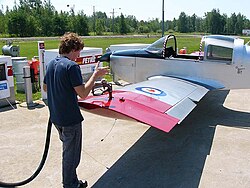
Back بنزين الطائرات Arabic 100LL Danish AvGas German بنزین هوایی Persian Avgas French Repülőbenzin Hungarian Avgas ID Avgas Italian Flybensin NB Avgas Polish
The examples and perspective in this article deal primarily with the United States and do not represent a worldwide view of the subject. (July 2015) |

Avgas (aviation gasoline, also known as aviation spirit in the UK) is an aviation fuel used in aircraft with spark-ignited internal combustion engines. Avgas is distinguished from conventional gasoline (petrol) used in motor vehicles, which is termed mogas (motor gasoline) in an aviation context. Unlike motor gasoline, which has been formulated without lead since the 1970s to allow the use of catalytic converters for pollution reduction, the most commonly used grades of avgas still contain tetraethyl lead, a toxic lead containing additive used to aid in lubrication of the engine, increase octane rating, and prevent engine knocking (premature detonation). There are ongoing efforts to reduce or eliminate the use of lead in aviation gasoline.
Kerosene-based jet fuel is formulated to suit the requirements of turbine engines which have no octane requirement and operate over a much wider flight envelope than piston engines. Kerosene is also used by most diesel piston engines developed for aviation use, such as those by SMA Engines, Austro Engine, and Thielert.